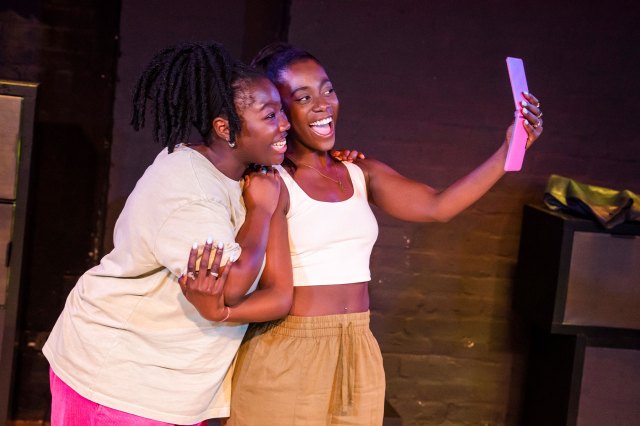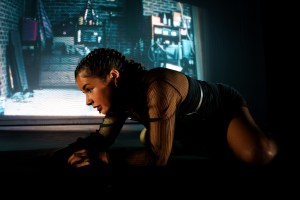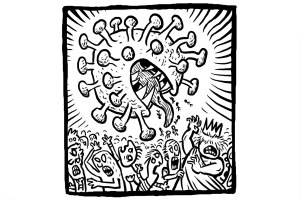FLIP! at Soho Theatre – review
Racheal Ofori’s social media satire continues until 25 November

“Alexa, show me plays about the evils of social media.” Given how integral the internet is to people’s lives, it’s surprising how few theatrical explorations of it there have been. James Graham’s interactive Privacy wrong-footed audiences nearly a decade ago, Jennifer Haley’s Royal Court and West End hit The Nether was an unsettling depiction of total immersion in a seamy virtual world, and earlier this year North London’s Park Theatre hosted the thriller Disruption which explored the dark side of tech and AI …but generally these aren’t themes that over-saturate the stage. It may be that the communion and immediacy of the theatre feels incompatible with the isolation and dispassionate slickness of cyberspace, or it might just be that it’s tricky to recreate. Racheal Ofori’s satirical two-hander FLIP! bounces in like a breath of fresh air however, and feels both familiar and bang up-to-date.
Best friends Carleen (Leah St Luce) and Crystal (Jadesola Odunjo) create online content full of energy, attitude, opinions (lots of opinions) and repeated catchphrases. They have a decent following but are forced to rethink their strategy after a misworded post brings the ire of thousands of strangers down upon their heads. FLIP! is a social media platform they’d previously dismissed but which now offers them an online rebirth with vastly bigger opportunities to influence, get noticed, and make a lot of money. Of course, this comes at a considerable price and that’s where the fundamental meat of Ofori’s play lies as Carleen embraces the get-rich-quick-at-any-price philosophy of FLIP! influencing (“working hard doesn’t work”) while Crystal hangs on to her integrity.
The first couple of minutes of Emily Aboud’s energised staging came at us like a train, with a chaotic, improvisational feel as St Luce and Odunjo snap, pose, robot-dance and bellow through Carleen and Crystal’s greatest online hits. It’s a little overwhelming but it’s also deceptive because, as the 75-minute production progresses, and the story darkens and disturbs, it becomes clear that it’s all choreographed and paced with painstaking care and precision.
Nowhere is this better demonstrated than by Eliyana Evans’s ingenious sound score, which switches between the acoustic ‘live’ voices of the actors and pre-recorded ones, and sometimes overlays the two to interesting effect. At times it’s not always clear whether we are listening to actual speech or whether the actors have started lip-syncing. It’s witty but a bit unsettling, like an aural equivalent of the AI which allows online contributors to “appear” in computer-generated content that they never actually filmed. Ofori’s script considers the implications of this as it drives an insurmountable wedge between the two friends.
Odunjo and St Luce are fabulous: fiery, funny but sensitive, and they find colours and depths that are not necessarily there in the writing as Ofori gives us so little background information on these young women or their relationships with anybody else. We are told initially that Carleen has to keep taking unfulfilling jobs to keep her financial plates spinning and there’s a suggestion that Crystal’s lifestyle is funded by her parents, but beyond that, it’s the vitality and charisma of the performers that sustain our interest and sympathy, rather than the material they’ve been given, sparky and intelligent though most of it is.
Odunjo is a gifted comic but convincingly explores Crystal’s anger and confusion at the loss of her long-standing friendship, and she’s especially good as the Machiavellian mistress of online monetisation who manipulates Carleen. St Luce starts out like a beam of warm, unfiltered light who progressively increases in poise and assurance while simultaneously becoming more dead behind the eyes as Carleen buys into her own myth. When the actors have to morph into various external commentators and talking heads, there isn’t always enough differentiation between the characters which can get a little confusing.
Ofori’s punchy, intermittently sinister play doesn’t throw up any major surprises or insights, but it’s a timely reminder, if one were needed, of the addictive nature of online engagement, and the hidden costs of making a financially handsome living from apparently doing very little. The dialogue bruises and delights, and Aboud keeps it moving at a terrific pace, and gives it a zany, almost cartoon-like sheen.
Ultimately, FLIP! is inconclusive, but that’s perhaps inevitable in that there are no solid answers given the newness of the subject matter, and it captures this precise moment in time with a bracing accuracy. As a story of a friendship, it’s less successful although the performances go a long way towards covering up the flaws. Thought-provoking and enjoyable.
















